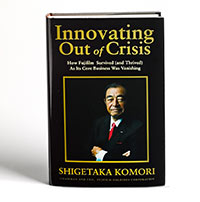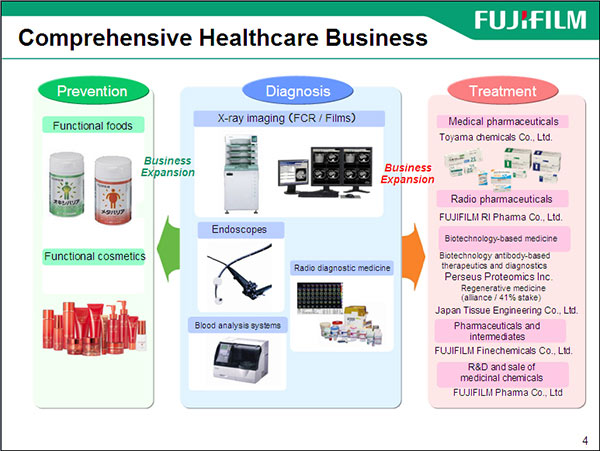Not just another management book: The inside story of the transformation of Fujifilm (Do you manage a business? Read this.)
posted Wednesday, September 23, 2015 at 7:47 PM EST

We don't normally do book reviews here at IR, let alone reviews of management memoirs. This felt worth sharing, though.
I've read my fair share of management books and executive biographies, and honestly, a lot of them seem to be just collections of catchphrases and cheerleading. I have a foggy miasma of business bromides floating around my brain that only occasionally surface in a way that positively affects my business decisions.
The book Innovating out of Crisis by Fujifilm Chairman and CEO Shigetaka Komori is something different.
Being involved in the photo industry for nearly 20 years now, I've wondered for a while just how it was that Fujifilm managed to survive the death of the film business. So I was interested in reading Mr. Komori's book on that basis, but honestly wasn't expecting much beyond that.
Instead, I found it packed with very practical advice, and more than its share of "Aha!" moments that will stay with me long after I've closed its pages.
As you'd expect in an executive autobiography, Mr. Komori comes off pretty well. He's clearly impressed with his own abilities and what he's accomplished, which could be off-putting to some people. Especially in American society, self-aggrandizement is frowned upon, and we tend to devalue such accounts. I have to admit, I reacted to this aspect of his narrative early on, myself.
But then I realized: "Wait a minute - this guy actually did turn around a global corporation, and point it in completely different directions than it had been following. Profitable ones, too." The contrast between Fujifilm's current robust health and Kodak's sad fate could hardly be more dramatic. Yet they both came from exactly the same business base, Kodak if anything having significantly more intellectual property to work with (patents and technical know-how) than its smaller Japanese competitor.

A useful lesson for many companies, regardless of their size...
Some will certainly point out that Kodak had a massive overhead structure going into the debacle, grown fat on years of easy profits as America's (and most of the world's) film supplier. That's true, and they as a result had a much bigger ship to turn, but they also had enormous technical know-how that they could have applied to other businesses and products, just as Fujifilm did. What they lacked was the clearheaded vision to see what was coming, and the decisive action to take the steps needed to deal with it.
These twin factors are where Mr. Komori's particular brilliance lies; not only was he able to see the train wreck coming, but he also agitated strongly for Fujifilm management to pay attention to it (that in itself being a rather un-Japanese thing to do), and when given the reins, he was decisive and forceful in doing what he needed to do, to reshape the company.
It would be easy for entrepreneurs and small businesspeople to dismiss a story like this as only relevant to people running large corporations. That couldn't be further from the truth, though. Basic business principles are universal, and Mr. Komori's advice and principles are applicable regardless of the scale of your own organization.

It's obviously hard to sum up a 200+ page book in a few words, but two recurring themes I saw were to "See clearly and unflinchingly; don't fool yourself" and "Decide and then commit fully." So many business failures (and I believe Kodak's debacle was prime among them) happen because leaders are simply unwilling to accept that the world has changed around them, and that the way things have always been isn't necessarily how they're going to be going forward. It's easy to half-decide and half-act, dithering back and forth, while time and opportunity are passing you by.
I mentioned experiencing a number of "aha" moments while reading this book. There were many, but the one that best illustrates for me the practicality of Mr. Komori's advice was this: Sometimes, faced with two alternatives, you just can't figure out which one is best. Despite analyzing and wrestling with the options, neither seems to be the clear winner. Mr. Komori faced this himself, and here's his take on it: "
But when you don't have any time to spare, what do you do then? I think about it this way: Maybe the reason you can't make up your mind is that there is no big difference between the two choices. Maybe both are correct.
...
And once your decision is made, you make sure it leads to success. Whichever way you choose, you give it everything you've got to make it work out in the end. That's all there is to it. Even when the outcome is unclear, you make the decision, confident that it's correct, and take the lead in achieving success — and then you actually do achieve success. That's what it means to be a leader
That may not resonate with everyone as it did for me, but the idea that the reason you're unable to make up your mind is because both options are equally viable really was a revelation to me.
But please, don't judge whether the book will be worth your time by that one example: There's a lot of business wisdom here, if you're willing to set your own ego aside and accept the schooling offered by Mr. Komori. It's a worthwhile read, not only for the advice, but also for the chance to glean a behind-the-scenes view of a company dealing with an existential crisis.
Highly recommended; if you have any role in managing a business, this is truly a book worth the time spent reading it. You can purchased this book here: Amazon.
---
(One final note I had to add: As a writer and editor myself, I have an appreciation for good writing, and am highly impressed with the job done by whoever handled the English-language translation and editing of Mr. Komori's book. I'm assuming the original was written in Japanese, but it doesn't read that way in the slightest. This English edition makes rich use of English idiom, making a huge contribution to the book's approachability and toward making it feel applicable to one's own business issues. Big kudos to the translator and editor, whoever they might be.)